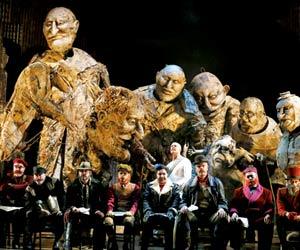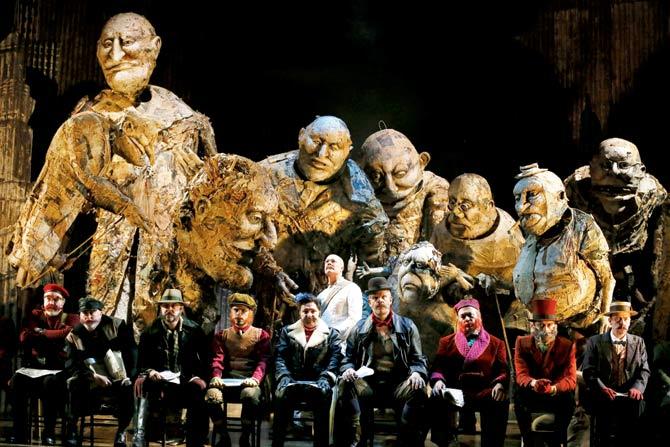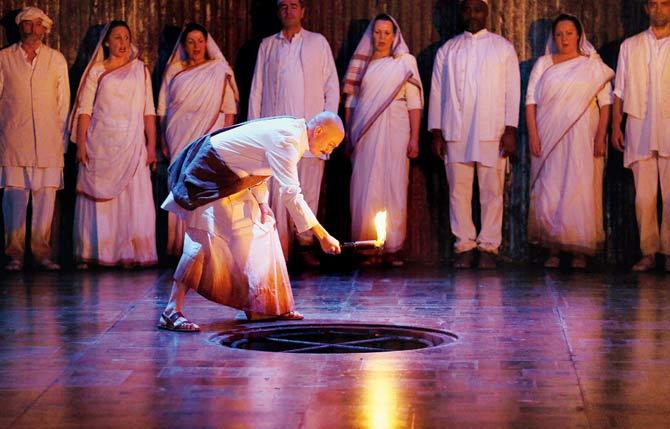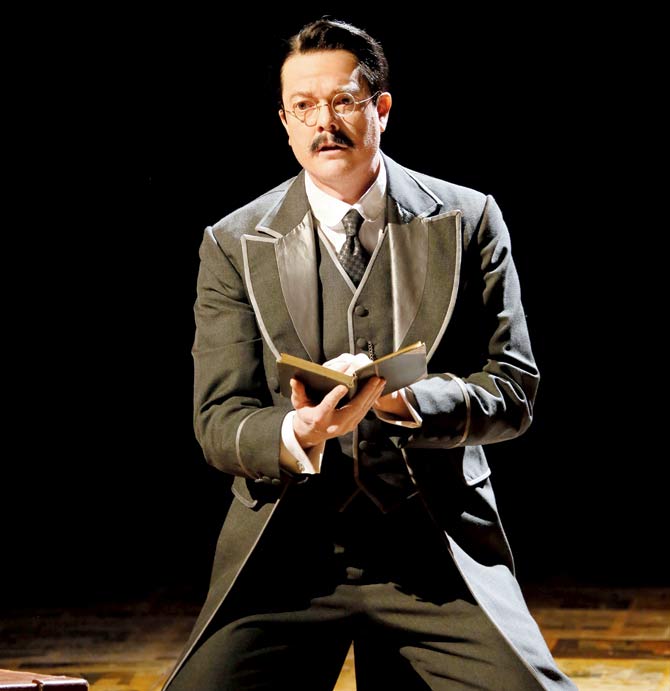As a philosophy, it somehow lost its original meaning between its rather tumultuous journey from Gandhi's lucid thoughts to history's myriad text books


British-born tenor Toby Spence's performance as Gandhi is heart-felt and leaves a commendable impression. Pics/Donald Cooper
Satyagraha was what made Mohandas Karamchand Gandhi world famous. It is also his beloved legacy to the world. While in simple global parlance, Gandhian satyagraha is defined by non-violent protest, in India, satyagraha is so historically enshrined that it automatically conjures images of British extremities and Indian resolve to overthrow its colonial rulers. Yet, as a philosophy, it somehow lost its original meaning between its rather tumultuous journey from Gandhi's lucid thoughts to history's myriad text books.
ADVERTISEMENT

So, Philip Glass and English National Opera's highly acclaimed opera Satyagraha - showing at London Coliseum - is a refreshing diversion. Now in its third run in a decade, and as popular as ever, at the prestigious London Coliseum in the heart of the city's west end, the opera uses the colonial trappings of Gandhi's younger days in South Africa as a backdrop to delves deeper into his idea of Satyagraha - "holding onto truth" or "truth force" - as a means of self-actualisation.

This three-hour long magnum opus is composed in Glass' signature style of minimalism and can either feel soothingly rhythmic or mind-numbingly repetitive. However, Phelim McDermott's artistic direction transforms the set into a visual kaleidoscope of the many colours of simplicity, yet creates a mesmerising grandeur that enthrals the audience with its innovation. Using corrugated card, newspapers from 2007 and endless roles of cello tape, the highly creative imagery uses giant puppetry of heroes and demons to make the stage come alive.

"Hold pleasure and pain, profit and loss, victory and defeat to be the same: then brace yourself for the fight. So, you will bring no evil on yourself", the rich baritone of Toby Spence booms in Sanskrit as a papier-mâché Arjuna, encouraged by Krishna, takes on his enemy in the grand battle on the Kuru Field of Justice (Kurushetra).
British born tenor, Spence, with heart-felt singing and commendable impression of Gandhi's personality is unforgettable even in his debut. Speaking exclusively to mid-day, Spence admits, "I don't look anything like Gandhi. Instead of trying to embody him physically, I have focused my efforts on capturing his spirit… to find a calm and stillness within my performance". With round glasses, wearing a trouser-dhoti and crisp white kurta, Spence is almost believable as a healthier white avatar of the Indian icon. "Oh, and I have shaved my head," he adds. That definitely helps.
Glass' opera is written entirely in Sanskrit, a language he fell in love with during his many travels to India. Soprano Charlotte Beament finds Sanskrit "a lovely language to sing in because of the open vowel sounds" but finds memorisation a difficult task. "I am memorising consonant and vowel sounds. It's like trying to learn a 600-digit number. Then singing it in different rhythms and pitches, in varying keys and time signatures, using a range of emotions, moving to the right place on stage, staying with my colleagues and the orchestra. It's a juggling act!" she admits.
Beament sings the "tricky" role of Miss Schlesen. "It sits in a tiring part of the soprano voice [up very high] and the music is relentless leaving little time to breathe and recalibrate," she confesses. Beament, however carries her performance with surprising ease.
The opera, written in three acts, replicates historically the different events of Gandhi's struggles in South Africa but aesthetically focus primarily on the influences of the three icons of Satyagraha: Leo Tolstoy who Gandhi drew inspiration from to build his philosophy (Act I); Rabindranath Tagore who served as his counsel in the movement's historical present (Act II) and; Martin Luther King Junior who drew inspiration from Gandhi's ideas of satyagraha (Act III).
The script moves rather sporadically from Mahabharata to the Tolstoy Farm (1910); from Indian Opinion (1906) to the burning of the registration cards (1908); from New Castle March (1913) to Gandhi's legacy. This non-linear nature of the opera and its multi-layered approach to disparate events in history embedded with the deep philosophies of these great thinkers, is perhaps a tad too tedious for the historically challenged. And, if you were expecting a big finish, sadly there is none.
"Satyagraha is not a biographical narrative piece," McDermott explains. "It is unique, as it is an opera about a concept." For McDermott, this concept is a spiritual practice, "a wonderful marriage of content and form" where performance cannot overshadow the ideas of satyagraha.
These ideas are brought to life by The Improbables skills ensemble as they conjure mythic and transformative images with simple materials, use aerial and acrobatic techniques coupled with puppetry to create a mesmerising tableau. There are no subtitles, but specific historical information and excerpts from the Sanskrit libretto in translation are projected in creative ways as tiny morsels of food for thought.
But, while the opera is a snapshot into history, it is quite contemporary in its vision. Both Beament and Spence find inspiration in the characters they play. Beament is glad to represent "a strong woman involved in something world changing" in the year Britain celebrates the centenary of the right to vote for some women. Spence who describes Gandhi as "clear", "vulnerable" and, "resolute" believes that "Gandhi's message of peaceful and persistent resistance has great value for us all in 2018."
Satyagraha may not be the soul purifying ritual that Gandhi had envisioned, but Glass' opera opens a window to introspection. As McDermott says, "It is perhaps only through opera - which is a unique form synthesising both power and vulnerability - that Glass manages to communicate the deeper soul levels of what Satyagraha actually means."
Catch up on all the latest Crime, National, International and Hatke news here. Also download the new mid-day Android and iOS apps to get latest updates
 Subscribe today by clicking the link and stay updated with the latest news!" Click here!
Subscribe today by clicking the link and stay updated with the latest news!" Click here!







